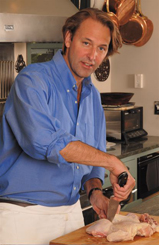
Fans of Anthony Bourdain’s hit travel show, Anthony Bourdain: No Reservations, will probably recognise 44-year-old food writer, Michael Ruhlman. After all, he did appear on not just 1, but 2 episodes (Las Vegas and Cleveland) of the popular series that chronicles the culture and cuisine of various locations around the world.
 Renowned for his insight into the world of food and restaurants, Ruhlman is an accomplished writer of various genres but most noted for his food-related works, such as his first in 1997 – The Making of a Chef. The book, as he explains on his blog, is a “dramatic narrative of an actual culinary education as it’s taught at the most prominent cooking school in the United States”. He attended classes at the prestigious Culinary Institute of America to research it.
Renowned for his insight into the world of food and restaurants, Ruhlman is an accomplished writer of various genres but most noted for his food-related works, such as his first in 1997 – The Making of a Chef. The book, as he explains on his blog, is a “dramatic narrative of an actual culinary education as it’s taught at the most prominent cooking school in the United States”. He attended classes at the prestigious Culinary Institute of America to research it.
Ruhlman has also worked with some of the best in the culinary world, like 3-star Michelin chef Thomas Keller, to co-author The French Laundry Cookbook.
Catching up with Ruhlman via e-mail, UrbanWire asked him to share with us his opinions about food writing, chefs and, of course, cuisine itself.
UW: Hi Michael, please share with us what you’ve been working on recently.
“Just coming out with a book called The Elements of Cooking, 8 essays and an opinionated glossary of cooks terms, a book about the fundamentals of cooking, everything you need to know as a cook.”
UW: Why did you decide to become a food writer instead of pursuing a career as a chef since you wrote that you have been “a devoted amateur cook since fourth grade”?
“I wanted to be a writer before I wanted to be a cook. I never wanted to be a cook, and still it’s a really tough row to hoe. You’ve really got to want it. Or have no other options. Just like being a writer. I’m a writer by necessity and disposition.”
UW: How did taking classes for The Making of a Chef affect the way you saw cooking as a profession, especially since you did a short stint as a line cook after that?
“It changed my whole life, changed the way I thought about the way I approached challenges, about the way I was a writer. And importantly, it gave me the language of the kitchen, which allowed me to go anywhere and speak the secret language and come back out of the jungle and write stories.”
UW: There are good chefs and great chefs, if you give them the same set of ingredients to prepare a meal, what do you think actually sets them apart?
“What would set them apart would be the fundamentals, how they used salt, how hot their pan was when they put the meat in, how hot their stock cooked.”
UW: Having co-authored The French Laundry Cookbook with arguably the greatest chef on the planet Thomas Keller, how has your perception of food changed?
“In just about every way. Keller taught me how to ‘see’ in the kitchen.”
UW: With all the food-related experiences that you’ve had so far, have you had any meal(s) that can be described as a culinary awakening?
“The French Laundry meal I wrote about in Soul of a Chef. That’s when my life changed again. But it could never have changed had I not learned how to cook.”
UW: The French have a cooking philosophy about how nothing goes to waste, but on your part, is there anything that you’re not game to try?
“Sandra lee’s recipes.”
UW: What’s the most essential ingredient that you can’t live without?
“Salt.”
UW: Is there anything about modern day cuisine that drives you up the wall?
“Bad technique, sloppy cooking, carelessness.”
UW: Probably a big threat to Singapore cuisine seems to be fast food chains like McDonald’s and KFC which are getting more popular with the younger generation, what’s your take on fast food?
“I think fast food is dangerous on too many levels to get into here. Probably the worst evil America has loosed on the world.”
UW: As a food writer, when you’re out on holidays in terms of cuisine, are you a traveller (eat as the locals do) or a tourist (eat as the tour guide instructs)?
“Totally local. Always ask where the locals eat lunch. Always.”
UW: Haute cuisine seems to be gaining more popularity in Singapore, but we still love our chicken rice nonetheless. What’s the most important part of haute cuisine that we should know about?
“That all cuisine comes down to details, whether it’s properly cooked chicken with properly cooked rice. Haute cuisine just has a lot more details.”
UW: Great chefs like Simon Gault have come to Singapore to do short guest stints, who do you think benefits the most, the young local chefs working under him, or the gastronomes eating the meal?
“Definitely the cooks who come to work, if only for the spiritual boost. And the charities the monies go to.”
UW: Cultural diversity is arguably the main reason behind why food is great. With globalization do you think that a culture’s cuisine might be in danger of losing its distinctiveness?
“Interesting question. Yes, there is the danger of homogenization as food becomes increasingly global, but that will only happen in high end world. Food is still local, no matter how we try to ship it all over
the place. Most people benefit by eating what grows nearby. And they’ll cook with those ingredients in distinctive ways that will remain local, so we will always have local cuisine, which is the best cuisine in the world!”
UW: At the end of the day, what would you pick, a home cooked meal with family and friends or a fine dining experience?
“Home cooked meal with my family and friends every time. Fine dining experience once ever few months is plenty for me. I’ve been lucky and have had my fill!”
For more information about Michael Ruhlman, please go to http://blog.ruhlman.com/
